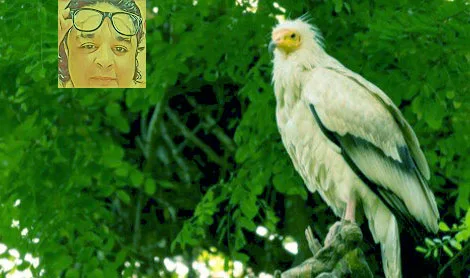## The Vulnerable Giant: Exploring the Lifespan and Threats Facing Vultures
Vultures, with their
distinctive bald heads and powerful beaks, are often overlooked in the tapestry
of wildlife. Yet, these magnificent scavengers play a vital role in maintaining
the delicate balance of ecosystems. They are nature’s clean-up crew, diligently
removing carcasses and preventing the spread of disease. However, despite their
critical ecological contributions, vultures face a multitude of threats, leading
to a decline in their populations and shortening their lifespans.
 |
## The Vulnerable Giant: Exploring the Lifespan and Threats Facing Vultures
**The Natural Lifespan of a Vulture:**
In the wild, the average
lifespan of a vulture ranges from 20 to 22 years. This relatively short
lifespan, compared to other avian species, is a consequence of their demanding
lifestyle and the harsh realities of their environment. However, individual
vultures can live significantly longer, with some reaching the ripe old age of 45
years in captivity.
Factors influencing a vulture's lifespan in the wild include:
* **Food Availability:** Vultures rely on a steady supply of carcasses
for sustenance. In areas with limited food availability, vultures might face
starvation or weakened immune systems, leading to a shorter lifespan.
* **Predation:** Although
vultures are formidable scavengers, they can become prey to larger predators
like lions, leopards, and eagles, especially when young or injured.
* **Disease:** Vultures are
prone to diseases contracted from the carcasses they consume, particularly
those infected with anthrax, botulism, or avian influenza.
**A Deepening Crisis: Threats to Vulture Survival:**
In recent decades, vulture
populations have experienced a dramatic decline, driven by a complex interplay
of human activities and environmental changes. This decline not only threatens
the species but also poses significant risks to human health and ecosystem
stability.
Here are some of the most pressing threats facing vultures:
1. **Poisoning:** Poisoning is a leading cause of vulture
mortality, largely due to the widespread use of pesticides and the illegal
practice of poisoning carcasses to eliminate predators. Vultures, drawn to the easy source of food, unwittingly
consume these contaminated carcasses, leading to severe poisoning and death.
* **The Case of Diclofenac:** The veterinary drug diclofenac, commonly used
to treat livestock pain, is particularly toxic to vultures. Even a small amount of diclofenac ingested
through contaminated carcasses can cause acute kidney failure and death. The
widespread use of diclofenac has been directly linked to the dramatic decline
of South Asian vulture populations, leading to a conservation crisis.
2. **Habitat Loss:** As human settlements expand, vulture habitats
are increasingly fragmented and destroyed. Deforestation, agricultural
intensification, and urbanization all contribute to the loss of suitable
nesting and foraging grounds for vultures. This loss of habitat not only
reduces the available food sources but also hinders their breeding and
dispersal, ultimately impacting their populations.
3. **Wind Turbine Collisions:** The rapid increase in wind energy
infrastructure poses a significant threat to vultures, particularly those with
long wingspans and migratory patterns. Collisions with wind turbine blades can
cause fatal injuries and have contributed to a decline in some vulture
populations.
4. **Electrocution:** Vultures are often electrocuted when they
perch or fly near power lines. Their large wingspan and tendency to perch on
high structures make them particularly vulnerable to this hazard.
5. **Illegal Hunting:** In some cultures, vulture body parts are
believed to possess medicinal properties or are used in traditional ceremonies.
This belief fuels a market for illegal hunting, further endangering vulnerable
populations.
6. **Climate Change:** Climate change is expected to exacerbate
existing threats to vultures. Droughts
and extreme weather events can impact food availability and habitat suitability,
ultimately affecting vulture survival and breeding success.
**Consequences of Vulture Decline:**
The decline in vulture
populations has far-reaching consequences for both ecosystems and human health.
Vultures play a vital role in:
* **Disease Control:** By consuming carcasses, vultures prevent the
spread of infectious diseases, reducing the risk of zoonotic outbreaks that can
impact human health.
* **Ecosystem Balance:** Vultures
contribute to the nutrient cycle by consuming and recycling organic matter, enriching
soil fertility and supporting plant growth.
* **Carrion Removal:** Vultures effectively remove carcasses, reducing
the risk of attracting other scavengers that might pose threats to livestock or
human health.
The decline of vulture
populations has led to an increase in the number of rotting carcasses, creating
a breeding ground for disease vectors like flies and rodents. These vectors can spread diseases like
anthrax and rabies, impacting livestock and humans alike.
**Conservation Efforts: A glimmer of hope:**
Despite the grim outlook, there
are numerous conservation efforts underway to protect vultures and prevent
their extinction.
* **Diclofenac Ban:** The
banning of diclofenac for veterinary use in several countries has been
instrumental in slowing the decline of South Asian vulture populations.
* **Habitat Protection:** Establishing protected areas and implementing
sustainable land management practices can help conserve vulture habitats.
* **Wind Farm Mitigation:** Implementing
measures like bird-friendly turbine designs and bird-detecting systems can
reduce the risk of vulture collisions with wind turbines.
* **Anti-Poaching Programs:** Enforcing anti-poaching laws and raising
awareness about the importance of vultures can help reduce the illegal hunting
of these birds.
**A Call to Action:**
The future of vultures hangs
in the balance. Protecting these
critical scavengers requires a multi-pronged approach involving governments, conservation
organizations, and individuals. By
understanding the threats they face and supporting conservation efforts, we can
ensure that these magnificent birds continue to play their vital role in
maintaining healthy ecosystems for generations to come.
**Conclusion:**
Vultures are not just
scavengers; they are a vital part of our planet’s ecological balance. Their decline is a stark reminder of the
interconnectedness of life and the impact that human activities can have on
biodiversity. By recognizing the threats
facing vultures, supporting conservation efforts, and making responsible
choices, we can contribute to their survival and ensure that these majestic
creatures continue to soar above us for generations to come.
